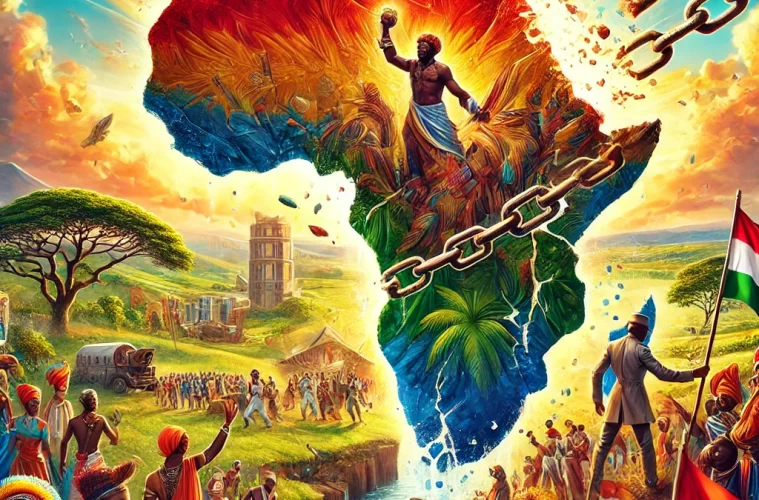Why Are Certain African Countries Breaking Chains with Their Colonizers, and Can This Impact the Consciousness of Africans in the Diaspora?
Across the African continent, a wave of political and economic assertiveness is sweeping through nations long tethered to their colonial pasts. Countries such as Mali, Burkina Faso, and Guinea are taking bold steps to sever ties with former colonizers, particularly France, challenging the status quo of neocolonial influence. This growing movement raises questions about the potential ripple effects on African diasporic consciousness and the global Black identity.
The Breaking of Colonial Chains
The impetus for breaking free from colonial-era bonds stems from decades of frustration over exploitative relationships. Many African nations continue to grapple with the legacy of colonialism: stunted economic development, dependency on foreign aid, and systems designed to benefit former colonizers. In particular, the use of the CFA franc, a currency controlled by the French Treasury and used by 14 African countries, has been a focal point of critique. Critics argue that this arrangement perpetuates economic servitude by allowing France to maintain significant control over the monetary policies of its former colonies.
Recent examples of breaking these chains include:
Mali: The Malian government expelled French troops, accusing them of failing to address security challenges while fostering dependency. They have instead sought partnerships with Russia to address domestic security issues.
Burkina Faso: Following a coup, the new leadership ousted French forces, emphasizing the need for sovereignty and resource control. They have promoted domestic resource management to benefit local communities.
Guinea: The government has called for the revision of mining contracts dominated by foreign firms, aiming to ensure more equitable resource distribution.
These nations seek to reassert sovereignty and chart their paths, free from external interference.
The Ripple Effect Across Africa
The actions of Mali, Burkina Faso, and Guinea have inspired other nations to consider similar moves:
Niger: Following a recent coup, Niger’s new leadership is re-evaluating its military agreements with France and questioning the exploitation of its uranium resources, a critical component of France’s nuclear energy sector.
Senegal: Civil society groups and activists have increasingly called for the abandonment of the CFA franc and a re-examination of French influence in domestic affairs.
Chad: The Chadian government has begun discussions on renegotiating foreign military presence and asserting greater control over its natural resources.
CAR (Central African Republic): The government has forged closer ties with Russia to counterbalance traditional Western influences, aiming for greater autonomy in security and governance.
Symbolic and Practical Implications
The symbolic break from colonial powers is as significant as the practical measures being implemented. By rejecting the vestiges of colonial domination, these countries send a powerful message of resistance and empowerment. This movement is further fueled by a younger, more politically conscious generation that demands accountability and justice for the systemic inequalities entrenched by colonial rule.
The implications extend beyond borders. African countries challenging neocolonial influence could inspire a larger, Pan-Africanist awakening. A unified Africa, economically and politically self-reliant, has long been a vision of leaders like Kwame Nkrumah and Julius Nyerere. The recent actions of certain African nations could serve as a catalyst for reinvigorating this vision.
The Diasporic Connection
The African diaspora, scattered across the globe due to centuries of slavery and migration, maintains a deep cultural and emotional connection to the continent. The growing assertiveness of African nations has the potential to reshape diasporic consciousness. For many in the diaspora, the symbolic act of breaking free from colonial chains resonates deeply, offering a source of pride and a renewed sense of identity.
This movement can inspire Africans in the diaspora to:
Invest in African-led Projects: Support businesses, technology, and development initiatives led by Africans to foster economic independence.
Promote African Culture: Highlight and celebrate African art, music, and history to counter negative stereotypes and reinforce pride in African heritage.
Advocate for Policy Change: Lobby for equitable trade agreements and policies that benefit African nations rather than perpetuate exploitation.
Strengthen Global Solidarity: Build networks across the diaspora to share resources, knowledge, and strategies for collective empowerment.
Challenges and Opportunities
However, the path to true independence is fraught with challenges. Breaking away from colonial powers often invites economic and political retaliation, including sanctions and diplomatic isolation. Furthermore, aligning with alternative powers like Russia or China brings its own risks of dependency and exploitation.
Yet, the potential benefits outweigh the risks. A self-determined Africa could lead to greater economic stability, increased intra-African trade, and a stronger voice on the global stage. For the diaspora, these changes could reinforce cultural pride, strengthen ties with the continent, and encourage investment in African-led initiatives.
The bold steps taken by certain African nations to break free from colonial chains are reshaping the continent’s narrative and challenging centuries of systemic exploitation. This movement, rooted in a quest for sovereignty and justice, has the power to resonate across the African diaspora, inspiring a renewed sense of unity and purpose. As Africa asserts its place in the global arena, the ripple effects on diasporic consciousness and solidarity could mark the beginning of a new chapter in the Pan-African story.




